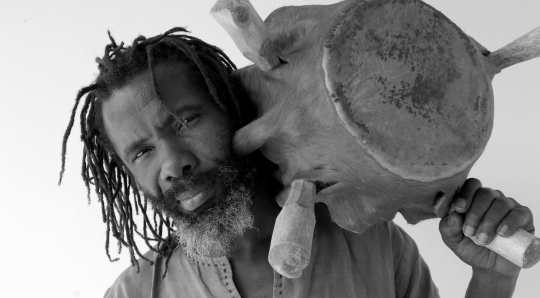|
The news form Haiti is heartbreaking. In a country that seems to lurch from one disaster to the next, the economic collapse that came with the assassination of President Jovenel Moise, the roving gangs that terrorize citizens, the rickety boat-filled Haitians desperately fleeing to other Caribbean Islands as well as South and North America, all seem almost too much to fathom. Itís as if the island nation is being perpetually punished for the slave uprising that expelled the French colonizers and led to the countryís 1804 independence. While Haiti has weathered coups, dictatorships, pandemics, hurricanes, earthquakes, and floods in recent years, its current situation is especially dire. And none of it has to be this way.
Beyond the overwhelmingly tragic stories in the media is a culture rich in music, the roots of which are found in vodou rituals brought from West Africa. These practices involve drums, harmony vocals, dancing and opportunities for spirits- Lwa- to join bodies for ecstatic trance. And despite western attempts to either condemn it as evil or portray it in a way that has depicted its practitioners as overly-sexual savages, it manages to survive, often allowing the opportunity for healthy, open expression in a country that continues to condemn homosexuality. Not surprisingly though, vodou rituals are endangered, as the country devolves into chaos.
Bonga Jean-Baptiste, a Haitian-born master vodou drummer now living in New York City has been performing and teaching children rhythm in an attempt to make sure the musicís practice lives on. Boula, the latest in a string of recent releases shows the drummer, singer, and Houngan (priest) exploring rhythms he learned as he traveled his home country as a young man. The record allows snapshots of the various regional rhythms, as well as lyrical themes shaped as songs. What they canít possibly capture is the experience one gets from a vodou ceremony; instead, they showcase Jean-Baptisteís vast knowledge of this music and offer an authentic recording of a centuries-old tradition. Consistently, Bouda captures deep harmony and call-and-response vocals over complex parts for multiple drummers for a listen thatís immersive. Itís also the first of his releases to feature him without collaborative musicians form other genres, which means itís the closest heís come to capturing the root essence of his music on record.
A video produced by DiscoverNEPA shows him in his Springfield, PA studio space, surrounded by homemade drums and his own artwork, explaining the importance of his music. Here, he expresses his joy in teaching and how central creating is to his life. He sees what he does in the US as a bridge to his work as a vodou priest, all of which helps keep his music and the traditions he draws from alive. In this way, his work is reminder that a houngan named Boukman inspired Toussaint Louverture to lead Haitians to independence in the first place.
Visit the artist online.
|
